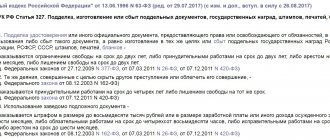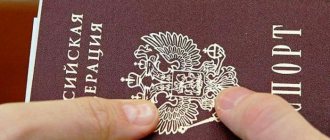1. Forgery of an official document granting rights or exempting from obligations for the purpose of its use or sale of such a document, or production for the same purposes or sale of counterfeit state awards of the Russian Federation, RSFSR, USSR, stamps, seals or forms -
shall be punishable by restriction of freedom for a term of up to two years, or forced labor for a term of up to two years, or arrest for a term of up to six months, or imprisonment for a term of up to two years.
2. Forgery of a citizen’s passport or certificate granting rights or exempting from obligations for the purpose of their use or sale of such documents -
shall be punishable by restriction of freedom for a term of up to three years, or forced labor for a term of up to three years, or imprisonment for a term of up to three years.
3. Acquisition, storage, transportation for the purpose of use or sale, or use of a deliberately counterfeit citizen’s passport, identity card or other official document granting rights or releasing from duties, stamps, seals or forms -
shall be punishable by restriction of freedom for a term of up to one year, or forced labor for a term of up to one year, or imprisonment for a term of up to one year.
4. Acts provided for in parts one to three of this article, committed with the aim of concealing another crime or facilitating its commission, -
shall be punished by forced labor for a term of up to four years or imprisonment for the same term.
5. Use of a knowingly forged document, except for the cases provided for in part three of this article, -
shall be punishable by a fine in the amount of up to eighty thousand rubles, or in the amount of the wages or other income of the convicted person for a period of up to six months, or by compulsory labor for a term of up to four hundred eighty hours, or by corrective labor for a term of up to two years, or by arrest for a term of up to six months.
- Article 326. Forgery or destruction of vehicle identification number
- Article 327.1. Production, sale of counterfeit tax stamps, special stamps or marks of conformity or their use
Commentary to Art. 327 of the Criminal Code of the Russian Federation
The main object of the crime is the normal activities of public authorities and management. An additional object is the rights and legitimate interests of citizens and legal entities.
The subject of the crime is a certificate and other official documents granting rights or exempting from duties, counterfeit state awards of the Russian Federation, the RSFSR, the USSR, stamps, seals, forms. The concept of these items (with the exception of the concept of a form and a certificate) was given when considering the corpus delicti under Art. 324 of the Criminal Code of the Russian Federation.
The form is a sheet of paper with a stamp imprinted on it. The impression can be angular or central. The stamp is depicted using a typographic method, but can also be made using a stamp. The form is used to produce a document. Forms can be regular and strict reporting (numbered).
A certificate is a document that confirms the identity of an individual and (or) his status or right. The certificate is issued by an authorized body, certified by an appropriate person, and can also be certified by a seal (for example, a driver’s license, hunting license, police officer’s ID, military ID, etc.).
The objective side of the crime can be accomplished by committing three types of alternative actions:
— falsification of an identity card or other official document granting rights or releasing one from obligations;
— sales of these items;
- production or sale of counterfeit state awards of the Russian Federation, RSFSR, USSR, stamps, seals, forms.
Forgery is the illegal alteration of an identity card or other official document. The method of forgery does not affect the qualification of the act and can be anything: erasure, addition, forgery of a signature, certification with a forged seal, re-taping a photograph. The forgery may concern the entire document being forged or part of it, for example, only a change in the name on the ID. The complete production of a false document is also considered a forgery.
Sale is the alienation of the subject of a crime, in which its owner changes. As with counterfeiting, the method of sale does not matter for the crime. Sales can be made through sale, exchange, donation, transfer in payment of debt, etc.
The production of duplicates of state awards, stamps, and seals of forms represents their complete creation or the introduction of such changes to them that change the status of the item, for example, changing the Order of Merit for the Fatherland, II degree, to the Order of Merit for the Fatherland, I degree. Illegality means the manufacture of said items in violation of existing legal regulations.
If the forgery of an official document is preparation for committing theft, for example fraud, the act should be qualified under Part 1 of Art. 30, art. 159 of the Criminal Code of the Russian Federation. Forgery of an official document by an official or civil servant or employee of local self-government bodies who are not officials, if there are appropriate signs, can be qualified under Art. 292 of the Criminal Code of the Russian Federation as official forgery.
The corpus delicti is formal. The crime is completed from the moment of counterfeiting for the purpose of selling or manufacturing the items specified in the disposition of the article.
The subjective side is characterized by guilt in the form of direct intent and a special purpose - to use or sell a counterfeit or manufactured object of a crime.
The general subject of the crime is a sane person who has reached the age of sixteen.
Qualified offenses (Part 2 of Article 327 of the Criminal Code of the Russian Federation) provide for liability for the commission of the act in question in order to conceal another crime or facilitate its commission. For example, the culprit falsifies documents in order to hide the theft.
The use of a knowingly forged document (Part 3 of Article 327 of the Criminal Code of the Russian Federation) is an independent crime. Use means that the perpetrator extracts or tries to extract useful properties of the document, for example, applying for a job using a fake higher education diploma, free travel on transport, etc. The use of the document is carried out in the form of its presentation, delivery, transfer, etc.
In Part 3 of Art. 327 of the Criminal Code of the Russian Federation there is no indication of a criminal law ban on the use of an official document. Therefore, a personal document should also be recognized as the subject of this crime.
The use of a knowingly forged document by the person who committed the forgery is covered by Part 1 of Art. 327 of the Criminal Code of the Russian Federation, and additional qualifications under Part 3 of Art. 327 of the Criminal Code of the Russian Federation is not required.
A deliberately forged document can also be used to commit crimes of various kinds. At the same time, the qualification of acts is carried out depending on the content of the crime. So, for example, the actions of a conscript or a person performing alternative civilian service who falsified an official document and used it for the purpose of evading conscription for military service or dismissal from alternative civil service are subject to qualification under a set of crimes provided for, respectively, Part 1 or Part 2 Art. 328 and part 1 of Art. 327 of the Criminal Code of the Russian Federation. If these persons only used a deliberately forged official document, then the act should be qualified under Part 1 or Part 2 of Art. 328 and part 3 of Art. 327 of the Criminal Code of the Russian Federation.
A person who, at the request of a conscript or a person performing alternative civil service, has forged an official document in order to evade conscription for military service or dismissal from alternative civil service is subject to liability under Part 5 of Art. 33, part 1 or part 2 of Art. 328 and part 1 of Art. 327 of the Criminal Code of the Russian Federation.
The theft of someone else's property or the acquisition of the right to it by deception or abuse of trust, committed using an official document forged by this person, granting rights or releasing from obligations, is qualified as a set of crimes provided for in Part 1 of Art. 327 of the Criminal Code of the Russian Federation and the corresponding part of Art. 159 of the Criminal Code of the Russian Federation.
If a person forged an official document, but due to circumstances beyond his control did not actually use this document, the act should be qualified under Part 1 of Art. 327 of the Criminal Code of the Russian Federation. The act must be qualified in accordance with Part 1 of Art. 30 of the Criminal Code of the Russian Federation as preparation for fraud, if the circumstances of the case indicate that the person’s intent included the use of a forged document to commit crimes under Part 3 or Part 4 of Art. 159 of the Criminal Code of the Russian Federation.
In the event that a person used a forged document he himself produced for the purpose of stealing someone else’s property by deception or abuse of trust, but due to circumstances beyond his control was unable to seize the victim’s property or acquire the right to someone else’s property, the act should be qualified as a set of crimes provided for in Part 1. 1 tbsp. 327, as well as Part 3 of Art. 30 of the Criminal Code of the Russian Federation and, depending on the circumstances of a particular case - the relevant part of Art. 159 of the Criminal Code of the Russian Federation.
Theft by a person of someone else's property or the acquisition of the right to it by deception or abuse of trust, committed using a forged official document produced by another person, is fully covered by fraud and does not require additional qualifications under Art. 327 of the Criminal Code of the Russian Federation.
In cases where a person, in order to evade paying taxes and (or) fees, falsifies official documents of an organization that grant rights or exempt from obligations, as well as stamps, seals, forms, what he has done, if there are grounds for it, entails criminal liability in the aggregate crimes under Art. 198 or art. 199 and art. 327 of the Criminal Code of the Russian Federation.
Parts 1 and 2 of Art. 327 of the Criminal Code of the Russian Federation does not establish liability for the sale of a counterfeit personal document. In this regard, the sale of such a document should be recognized as its use and the actions of the perpetrator should be qualified under Part 3 of Art. 327 of the Criminal Code of the Russian Federation.
The elements of using a deliberately forged document are formal. The subjective side is characterized by direct intent. The general subject of the crime is a sane person who has reached the age of sixteen. As a rule, this is a person who is not the manufacturer of the counterfeit document.
What is signature falsification
There are different cases when one person signs documents for another. Situations can be quite harmless. For example, when a schoolchild copies a parent’s autograph in a diary so that the father does not see a bad mark. Or one employee signs for another when receiving a salary in the accounting department, because he has no time, but he comes to collect the money himself.
There are situations that are even more serious. For example, an accounting employee signs the chief accountant’s autograph on reporting documents for the tax office. At the same time, the manager is not notified about this, but simply sends reporting papers, because deadlines are running out, and the chief accountant has no time.
The peculiarity of these situations is that forging signatures on documents does not lead to any serious negative consequences. One fine day, the parents will still punish the student, the salary will reach the recipient, and the company’s accounting department will submit reports on time.
It’s another matter when an autograph is signed not for a good purpose, but in order to receive a certain benefit, most often material. Or the document has social importance, official status. Then the consequences of having a signature of a person who did not have the right and grounds to sign the paper will be different.
“The presence of a person’s signature on an official document gives it legal force,” comments lawyer Alexey Karabaev. “That’s why you can’t put someone else’s autograph on papers, no one has the right to do that.” According to the law, this is considered counterfeit and carries criminal penalties.”
pixabay.com/
Judicial practice under Article 327 of the Criminal Code of the Russian Federation
Resolution of the Presidium of the Supreme Court of the Russian Federation dated November 29, 2017 N 217P17
Syasko Valentin Anatolyevich, ... was detained on July 19, 2006 in accordance with Art. Art. 91, 92 of the Code of Criminal Procedure of the Russian Federation on suspicion of committing crimes under Part 4 of Art. 159, part 3 art. , part 1 art. 327, part 3 art. , part 3 art. 327 of the Criminal Code of the Russian Federation.
Appeal ruling of the Appeal Board of the Supreme Court of the Russian Federation dated January 18, 2018 N APL17-535
upon completion of the investigation of the criminal case against Pushkarev I.S. under Part 6 of Article 290 of the Criminal Code of the Russian Federation, paragraph “a” of Part 2 of Article 204 of the Criminal Code of the Russian Federation and Part 3 of Article 285 of the Criminal Code of the Russian Federation, Pushkareva A.S. under paragraph “a” of part 2 of article 204 of the Criminal Code of the Russian Federation and part 5 of article 291 of the Criminal Code of the Russian Federation, Lushnikova A.V. under Part 5 of Article, Part 6 of Article 290 of the Criminal Code of the Russian Federation, Part 3 of Article 204 of the Criminal Code of the Russian Federation, Part 2 of Article 201 of the Criminal Code of the Russian Federation and Part 3 of Article 327 of the Criminal Code of the Russian Federation and approval of the indictment, Deputy Prosecutor General of the Russian Federation V.Ya. Grin appealed to the Supreme Court of the Russian Federation with a petition to change the territorial jurisdiction of this criminal case.
Resolution of the Presidium of the Supreme Court of the Russian Federation dated April 11, 2018 N 9P18
Turukalov A.A. acquitted of charges of committing a crime under Part 2 of Art. 327 of the Criminal Code of the Russian Federation, due to the absence of corpus delicti in his actions. By cassation ruling of the judicial panel for criminal cases of the Krasnoyarsk Regional Court dated September 2, 2010, the verdict of the Zheleznodorozhny District Court of Krasnoyarsk dated June 21, 2010 in relation to Turukalov A.A. changed: the instruction on taking into account, when imposing punishment, the motive, the amount of damage caused, and disregard for the authority of state power in the person of the head and officials of the Krasnoyarsk administration when committing crimes was excluded from the motivational part; assigned to Turukalov A.A. the punishment was reduced under Part 3 of Art. 159 of the Criminal Code of the Russian Federation up to 2 years 4 months of imprisonment for each of two crimes, under Part 4 of Art. 159 of the Criminal Code of the Russian Federation - up to 5 years 10 months of imprisonment, under Part 3 of Art. , part 4 art. 159 of the Criminal Code of the Russian Federation - up to 5 years 4 months of imprisonment; on the basis of Part 3 of Art. of the Criminal Code of the Russian Federation for the totality of crimes, by partial addition of punishments to Turukalov A.A. finally sentenced to 7 years of imprisonment in a general regime correctional colony. The verdict in terms of resolving the issue of material evidence was canceled, and the criminal case in this part was transferred to a new trial in the execution of the sentence. The rest of the verdict is against Turukalov A.A. left unchanged.
Appeal ruling of the Judicial Collegium for Criminal Cases of the Supreme Court of the Russian Federation dated June 27, 2018 N 56-APU18-6SP
On September 7, 2006, a criminal case was initiated against the father of candidate D. - D. under Art. 327 part 3 of the Criminal Code of the Russian Federation, which on April 9, 2009 was terminated by the investigator due to the expiration of the statute of limitations for criminal prosecution, while D. during interrogation explained that his son G., born in 1982, lived with him, which, in the opinion of the state prosecutor, indicates about the awareness of candidate D. about bringing his father to criminal liability and about the termination of the criminal case against him.
Resolution of the Presidium of the Supreme Court of the Russian Federation dated September 19, 2018 N 114P18
according to Part 3 of Art. 327 of the Criminal Code of the Russian Federation to 1 year of correctional labor with the withholding of 10% of earnings to the state income. Based on Part 3 of Art. The Criminal Code of the Russian Federation imposed a sentence of imprisonment for a term of 18 years for the totality of crimes.
Appeal ruling of the Judicial Collegium for Criminal Cases of the Supreme Court of the Russian Federation dated September 25, 2018 N 5-APU18-50sp
November 22, 2021 under Part 1 of Art. 322, part 3 art. 327 of the Criminal Code of the Russian Federation, in accordance with Part 2 of Art. , art. of the Criminal Code of the Russian Federation to punishment in the form of imprisonment for a period of 1 year 15 days with serving in a high-security correctional colony,
Appeal ruling of the Judicial Collegium for Criminal Cases of the Supreme Court of the Russian Federation dated September 14, 2018 N 4-APU18-28SP
- according to Part 1 of Art. 327 of the Criminal Code of the Russian Federation (for committing three crimes) for 9 months of restriction of freedom for each crime (the restrictions are established in the sentence), released from punishment in accordance with paragraph 3 of Part 1 of Art. 24 Code of Criminal Procedure of the Russian Federation; - according to Part 3 of Art. , part 4 art. 159 of the Criminal Code of the Russian Federation for 6 years of imprisonment with a fine of 300,000 rubles, with restriction of freedom for a period of 9 months;
Cassation ruling of the Judicial Collegium for Criminal Cases of the Supreme Court of the Russian Federation dated November 1, 2018 N 80-O18-1SP
sentenced to imprisonment under paragraph “z” of Part 2 of Art. 105 of the Criminal Code of the Russian Federation using Part 1 of Art. Criminal Code of the Russian Federation by 13 years; Part 3 Art. 158 of the Criminal Code of the Russian Federation by 4 years; clause "a" part 3 art. 226 of the Criminal Code of the Russian Federation by 6 years; Part 2 Art. 222 of the Criminal Code of the Russian Federation for 2 years; clause "a" part 2 art. 166 of the Criminal Code of the Russian Federation using Part 1 of Art. Criminal Code of the Russian Federation for 3 years; Part 1 Art. 167 of the Criminal Code of the Russian Federation (for the episode of destruction of G.’s car) using Part 1 of Art. Criminal Code of the Russian Federation by 1 year; clause "a" part 2 art. 163 of the Criminal Code of the Russian Federation (as amended by Federal Law of June 13, 1996 N 63-FZ) (in cases in relation to B. and B.) using Part 1 of Art. Criminal Code of the Russian Federation by 4 years; Part 3 Art. 327 of the Criminal Code of the Russian Federation to 1 year of correctional labor with the withholding of 10% of earnings to the state income.
Appeal ruling of the Judicial Collegium for Criminal Cases of the Supreme Court of the Russian Federation dated December 6, 2018 N 4-APU18-42
As follows from the presented materials, the law enforcement agencies of the Republic of Tajikistan are prosecuting Tursinaliev for committing a crime under paragraph “b” of Part 4 of Art. 247 of the Criminal Code of the Republic of Tajikistan, which is also punishable by the criminal legislation of the Russian Federation and corresponds to Part 3 of Art. 159 of the Criminal Code of the Russian Federation, and for committing a crime under Part 1 of Art. 340 of the Criminal Code of the Republic of Tajikistan, which is also punishable by the criminal legislation of the Russian Federation and corresponds to Part 2 of Art. 327 of the Criminal Code of the Russian Federation, the sanctions of which provide for punishment in the form of imprisonment for a term of over one year.
Appeal ruling of the Judicial Collegium for Criminal Cases of the Supreme Court of the Russian Federation dated January 31, 2019 N 5-APU19-2
Yusupov is accused of committing acts punishable under Part 4 of Art. 159, part 1 art. 327 of the Criminal Code of the Russian Federation by imprisonment for a term of more than one year. The statute of limitations for criminal prosecution has not expired. The materials of the extradition check contain information that the applicant hid from the law enforcement agencies of the Kyrgyz Republic, which initiated his search. He was detained on the territory of the Russian Federation. The subsequent selection of a preventive measure in the form of detention and extension of the period of detention was carried out in accordance with the procedure established by the Code of Criminal Procedure of the Russian Federation.
Appeal ruling of the Judicial Collegium for Criminal Cases of the Supreme Court of the Russian Federation dated December 26, 2018 N 203-APU18-25
- November 20, 2014 under Part 3 of Art. 223, part 3 art. clause "a" part 2 art. 205, part 3 art. 222, paragraph “a”, part 2, art. 205, part 3 art. 222, paragraph “a”, part 2, art. 205, paragraph “a”, part 2, art. 205, part 3 art. 222, paragraph “a”, part 2, art. 205, part 3 art. 222, paragraph “a”, part 2, art. 205, part 3 art. 222, paragraph “a”, part 2, art. 205, part 3 art. 222, paragraph “a”, part 2, art. 205, part 3 art. 222, part 1 art. 222, part 2 art. 327, part 1 art. 322, part 3 art. 327 of the Criminal Code of the Russian Federation; on the basis of Part 3 of Art. of the Criminal Code of the Russian Federation to 13 years in prison with a fine of 50,000 rubles,
Why is it easy to fake a seal?
During the Soviet era, the production of round stamps with the name and details of the enterprise, as well as with a corporate image or other additional inscriptions, could only be carried out by specialized stamping and engraving workshops. With the entry into force of Order No. 48 of the Ministry of Internal Affairs of the Russian Federation dated February 14, 1994, control by law enforcement agencies over the activities of such special enterprises is no longer exercised.
Today, any company can produce stamps. You do not need to obtain special permission from the Ministry of Internal Affairs for this. Anyone can order a company seal, even those who are not employees of the company. In this regard, cases of falsification of imprints on documents have become more frequent.
Where to contact
If an official, employee of an organization or other citizen has information or suspicion of making counterfeit seals or falsifying an imprint, then it is necessary to file a statement with the police. The appeal is written in any form.
It should indicate:
- name of the department of the Ministry of Internal Affairs;
- information about the applicant;
- description of the offense;
- a request to initiate a criminal case.
The application must be accompanied by available evidence of the crime committed. If the applicant knows who committed the offense, this information should also be included in the application.
Police officers will conduct an investigation, identify the perpetrators and transfer the materials to the judicial authority. The court has the right to order an independent examination to establish the fact of falsification of the stamp.
If this fact is confirmed, then all documents certified by such a seal will be declared invalid. Transactions concluded using a counterfeit seal will be cancelled.
Why falsify a seal?
The company's stamp is placed on all legally significant documents:
- contracts;
- orders;
- powers of attorney;
- certificates of completed work;
- decisions of LLC participants;
- reporting to regulatory authorities;
- certificates
By making a false seal, a person can conduct fraudulent transactions on behalf of a company, obtain bank loans, or carry out other financial fraud. Most often, a fake imprint is left on invoices, invoices, payment orders and other documents. The main goal is to shelter the real income of the enterprise from taxation.
In addition, without a seal, documents issued by medical institutions - sick leave certificates, prescriptions for the purchase of medications at a pharmacy - are invalid.
Having a false stamp, a citizen will be able to freely purchase illegal, psychotropic or narcotic drugs, mislead the employer and illegally receive money for a fake sick leave.
How to spot a fake
The authenticity of a seal impression can be determined visually or through examination. When examining the print, pay attention to the following details:
- presence of spelling errors;
- content and placement of the drawing;
- font size;
- character spacing;
- overall print size;
- degree of uniformity of distribution of stamp ink;
- mirror reflection.
The first sign of falsification is a blurry, too weak or, on the contrary, too bright print. Distortion of small details, such as a missing dot, also indicates a fake.
Mirroring is an obvious falsification of a seal impression, since this effect is obtained after copying the original print.
The original stamp is always symmetrical, the symbols are located at the same distance from each other, the text is located strictly along the radius of the circle.
In addition, a person who doubts the authenticity of a seal can contact an expert organization that will help identify a fake. If the expert’s conclusion establishes that the seal is forged, this will be the basis for appealing to a judicial authority.






